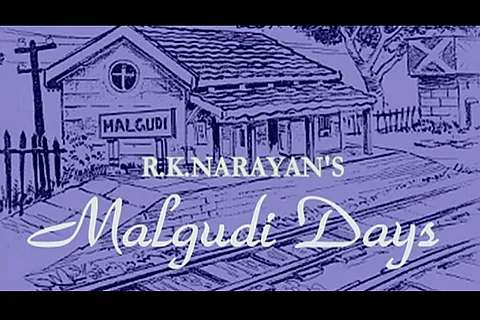

It's been thirty years since “Malgudi Days” aired on TV. I did not grow up watching it since I did not understand a word of Hindi back in the day. But I did grow up reading RK Narayan, and continue to escape into Malgudi whenever I need to clear my brain of polysyllabic words and sophistic garbage that makes up much of my reading these days.
RK Narayan was the first Indian writer I enjoyed reading. I discovered "Swami and Friends" on a Sunday afternoon when I was around the age of ten. I'd exhausted my Enid Blyton collection, and Nancy Drew with her dashing boyfriend simply did not capture my imagination. I'd read Premchand's stories translated in English on my mother's insistence, but these I read as a duty. I liked the stories but the English did not sit well with me. The translations were often stilted and formal, distancing me as a child reader.
My edition of "Swami and Friends" was of inferior production quality compared to the Western children's books that I read. I opened the book only because I had nothing else to do. But from the very first page, I was hooked. This was a novel published in 1935 and it still resonated with me so much.
One of the greatest pleasures of literature is to discover a fictional character who is just like you or a person you know. You're amazed that the writer, who has never met you, has peeked into your brain and produced this person who is so utterly familiar that reading the book becomes an intimate, secret ritual that you guard jealously from the rest of the world. This is why people become possessive about the books they love, this is why their heart lurches when you fold the book's cover carelessly or scribble on the pages. You are trespassing on sacred ground. "Swami and Friends" was in that category.
After "Swami and Friends", I was irrevocably in love with Malgudi and its many characters. Narayan's insightful humour was built on affection for the human predicament. His ability to sketch a character was nothing short of genius. His novels were slim, scant on details about the surroundings, people's physical descriptions...and yet, you could visualize Malgudi and its inhabitants as clearly as people in your own family. You knew the mangroves, the Sarayu, Lawley Extension, Kabir Street, Mempi Forest, like the back of your hand.
Narayan achieved the tremendous task of Indianising English before the likes of Salman Rushdie gave respectability to the "chutneyfication" of it. Even though Narayan's characters almost never mixed up languages and spoke in English, the heart of the idiom was quintessentially Indian. I don't know how he managed it and I've not read any other Indian author who has accomplished this with the same effortlessness that he did.
Narayan did not write specifically for children. But his books often feature children and young people who were allowed to act their age. They came from conventional, unremarkable family set-ups, but were still interesting and had stories to tell. This was a revelation to a child like me who was convinced that one ought to have a dog and live in England if one were to have any story worth narrating. Or at the very least, come from a dysfunctional family.
I've returned to his books like "The Guide", "The Bachelor of Arts", "The English Teacher", "Grandmother's Tale", "The Vendor of Sweets", "My Dateless Diary" and many more over the years when I've found the world too weary to take. Each time, I've gone back with my faith restored. Narayan has been criticized for his "surface level" writing which doesn't get into problematic caste, class or gender equations but I love him too much to berate him for this disinterest.
When I started writing my own books, Narayan was without a doubt a huge influence. It was thanks to him that I developed a love for the ordinary and the inane. There were no "clever" or explosive plot devices in his stories. Life was dramatic enough if you were a keen observer. The idiosyncracies of his characters were always real and believable. I remembered him whenever I was tempted to insert a bipolar penguin in the narrative just to liven things up.
Reading Narayan helped me understand how to put words into a character's mouth that would seem natural for the person – not dictated by Wren and Martin. His spare sentences were never written to wow the reader with his vocabulary or intellect. They were there simply for one purpose - to narrate the story. The lack of ego in his writing was touching and precious. Also, inimitable.
As children, the stories we made up were mostly set in foreign locales or fantasy lands, it was Narayan who nudged me to discover the beauty of my own backyard.
And it was only when those doors opened, when my characters stopped drinking ginger beer and building snowmen, that they became people whose stories I knew how to tell.
Note: Views expressed are the personal opinions of the author.